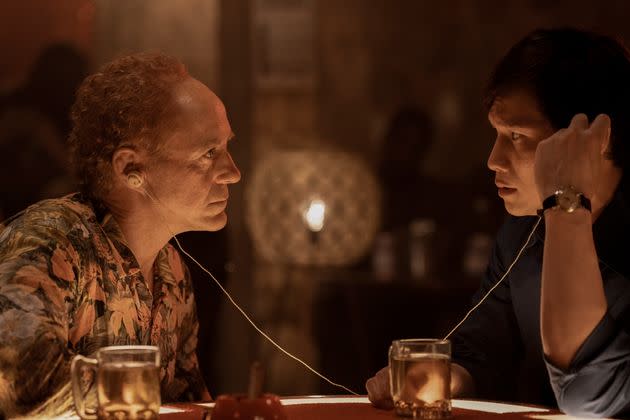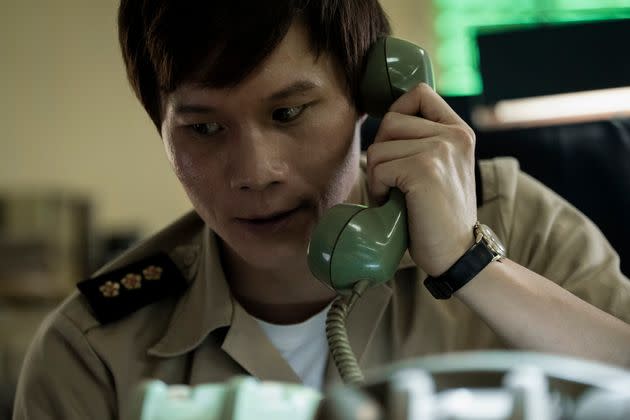HBO's Stylish Adaptation Of 'The Sympathizer' Is A Watered-Down Version Of The Book
- Oops!Something went wrong.Please try again later.

There’s a brief moment at just about the midpoint of HBO’s adaptation of “The Sympathizer” when the show’s recurring flaw really settles in. Its fourth episode chronicles the filming of a movie within the story. Like in the miniseries’ source material — Viet Thanh Nguyen’s Pulitzer Prize-winning novel of the same name — this fictional Hollywood production bears a strong resemblance to Francis Ford Coppola’s 1979 Vietnam War epic, “Apocalypse Now.” The novel and series’ unnamed protagonist is an adviser on the movie, directed by a volatile white male filmmaker simply called the Auteur.
Ostensibly, our protagonist — known to most people around him as an ex-captain in the South Vietnamese army, now living in the U.S. as a refugee — is there to make sure that the film and its portrayals of Vietnamese characters are culturally sensitive. But at best, he’s really there to try to temper anything super racist. (And for the most part, his attempts at course correction are utterly futile.)
The episode departs from the book in several ways, including when someone places a deer’s bloody head in another person’s bed. It’s a clear nod to “The Godfather” — and a bit too on the nose.
That lack of subtlety and taking a reference one step too far sum up the most frustrating shortcoming of the seven-episode limited series, which premieres Sunday night. Adapted by Park Chan-wook and Don McKellar, the show on its own is a stylish, impressively shot and well-acted spy thriller following the travails of the protagonist, who is secretly a communist agent.
But crucially, the series loses the heft of the book, sanding down its sharp edges. Elements of its mordant satire don’t cut through, and the novel’s searing commentary on who gets to tell stories about war and how they’re too often flattened is largely forgotten, only really explored in that one episode.
To put it more bluntly, the book understands that the audience is smart. The series, however, seems to think that we can’t be trusted to piece everything together ourselves.
Visually, it’s hard not to be immediately drawn in by the show’s auteurist touches. Each episode opens with the familiar HBO static logo — but in a preview of what’s to come stylistically, the shot zooms in on the “O” to form part of a scrolling film reel. There’s a wealth of visual references to movies of the 1970s, including not only Coppola’s films but also Martin Scorsese’s “Taxi Driver.”

As the protagonist, referred to only as the Captain, Hoa Xuande — best known for a recurring role on Netflix’s live-action “Cowboy Bebop” series — carries the show as its breakout star. Around him, there’s a wonderful ensemble of supporting players, including Toan Le as his boss, the General; Fred Nguyen Khan as his childhood friend Bon; and Vy Le as Lana, the General’s daughter. Familiar faces also pop in and out of the series, like Sandra Oh, who is fantastic as always. And you might do the “Leo pointing” meme upon seeing the actors who appear in the movie within the show, adding to the meta quality of that storyline.
Then there’s the Robert Downey Jr. of it all. Much of the advertising for the series has highlighted the fact that the newly minted Oscar winner portrays multiple roles: several of the white men in the protagonist’s life, including a CIA agent and ally of the General; a racist and mansplaining “Oriental studies” professor; and a Republican congressman whose main campaign pitch involves pandering to the Vietnamese refugee community by touting his opposition to communism. Downey’s truly gonzo performance is a fun commentary on the interchangeability of these white men, all of whom represent the colonizer in various forms.
On a practical and mercenary level, his star power likely helped the series get made. (He also serves as an executive producer.) But after a few episodes, his stunt casting becomes distracting and even a bit grating.
That kind of maximalism hampers the series at every turn. Just when you’ve gotten the point, the show hits it again, in case it wasn’t clear the first time. Much of the book concerns all of the ways that the protagonist is grappling with dual identities in his life and how he never quite fits in anywhere. He’s the biracial “bastard” child of a Vietnamese woman and a French priest. He’s on both sides of the Vietnam War simultaneously, embraced by the American political establishment as an anticommunist fighter while secretly sending information back to a childhood best friend named Man, a communist operative.
Upon arriving in America as a refugee, he struggles with feeling not Vietnamese enough but not quite American either. All of those representations of duality are inherent to the book. But in the series, they’re often spelled out with too heavy a hand.

Maybe it’s a cliché to say this about an acclaimed novel, but so much of what makes the book a page turner is the text itself. This is especially true of the novel’s interiority, which is hard to capture on-screen without being blunt in the dialogue and visual cues. And so much of the book is about the written word. Case in point: The framing device of both the book and the series is a written confession from the protagonist, which can be clunkier to convey visually than on the page.
This isn’t the place to rehash the perennial question of whether certain books are unadaptable. Books and their screen versions have different reasons for existing. There are so many ways to approach the adaptation process that don’t fall into a simple binary of remaining faithful to the original material or not.
One central argument for this series is visibility: More people are likely going to encounter the story of “The Sympathizer” through the HBO show than the novel. And in our age of Hollywood conglomerates regurgitating existing IP and trying to squeeze every drop out of lemons that went dry long ago, it’s undoubtedly more creatively fresh to adapt a groundbreaking novel from an acclaimed Asian American author than to, say, reboot an old franchise and shoehorn in some surface-level diversity.
At the same time, it’s disappointing when the result strips away a lot of what makes the source material distinctive. There’s a biting irony in an adaptation of Nguyen’s book — a novel about how the stories we collectively tell about wars are far more complicated than two sides, and how they routinely get watered-down — being itself watered-down. But that’s Hollywood for you.
“The Sympathizer” premieres Sunday, April 14 on HBO.
